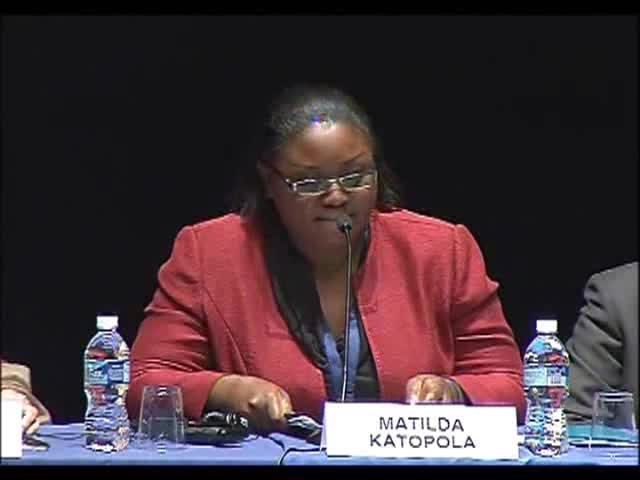Clerk of Parliament Matilda Katopola has refused to certify and send the bills Parliament has passed to the President unless matters surrounding her compulsory leave are concluded.
Speaker of Parliament Henry Chimunthu Banda on Friday sent to Katopola a memorandum reference NA/SOP/2 containing seven of the passed bills for her certification before forwarding them to the President.
Among the bills is the Appropriation Bill—which when assented to by the President—will allow the just passed K408 billion (about $1.6 billion) budget to become effective.
National Assembly Standing Order 126 reads: “When a bill has been read a third time, it shall be deemed to have been passed and three clean printed copies thereof, certified correct by the Clerk, shall as soon as possible, be submitted to the President.”
And the President is required to assent to the bill within 21 days after the submission by the Clerk.
All this may be in jeopardy as Katopola was sent home in May 2012 by the Speaker, who chairs the Parliamentary Service Commission, pending conclusion of job tenancy.
Katopola’s refusal to certify the bills means that they will not go to the President for her assent so that they become laws.
In an exclusive interview on Saturday, Katopola confirmed she received a memo from the Speaker asking her to certify the bills before forwarding them to the President and that she refused to do so until issues surrounding her compulsory leave are concluded.
Said Katopola: “As you are aware, there was a recommendation by the Parliamentary Service Commission [PSC] to terminate my services soon after the opening of the budget sitting of Parliament. A week later, I got a letter from the commission sending me on compulsory leave and I was not given reasons and I was not informed about the status and position regarding parliamentary issues including the budgetary proceedings.
“Now…they send me assent copies when I was not part of the process. I was not even mandated to sign or communicate any official document on behalf of Parliament. In what capacity will I sign the assent copies?
“There are issues surrounding recommendations for my removal and, in addition, government has charged me with an offence that I am not aware of. I want the Speaker to clarify this position because these are matters that are touching on the Constitution and legitimacy.”
Katopola also said all what she wants are her benefits up to 60 years of age she would have attained in 2030 when she would have retired.
“Unless the issues surrounding my status as COP [Clerk of Parliament] are clarified, I cannot sign. Otherwise, I will be dealing with issues illegally and unconstitutionally. I do not want to be accused of some sort of misconduct as I am on compulsory leave. They should give me my benefits up to retirement age, which is in 2030.”
But the Parliamentary Service Act gives room for the Deputy Clerk to act on behalf of the Clerk in the case of absence.
Chimunthu Banda on Sunday referred the matter to the Deputy Clerk of Parliament for Parliamentary Services, Henry Njolomole, who said he needed time to verify the report that his boss was refusing to certify the bills.
Blantyre-based lawyer and executive director of Justice Link, Justin Dzonzi, said where a Standing Order is in conflict with a provision in the Parliamentary Act, the latter takes the precedence because Standing Orders are not laws.
Dzonzi concurred with Katopola that without the President assenting to the bills, they will not become effective laws.
The Speaker referred Katopola’s forced leave issue to President Joyce Banda on May 21 2012 for the President’s approval to terminate her services and give her all her benefits up to retirement age.
Wrote the Speaker: “In this regard, you may wish, to note, Your Excellency, that the law requires that it is only upon Your Excellency’s approval that the Clerk of Parliament be removed from office. The Commission further recommends that upon termination of her services, if approved by Your Excellency, the Clerk should get all her benefits up to retirement age.”




